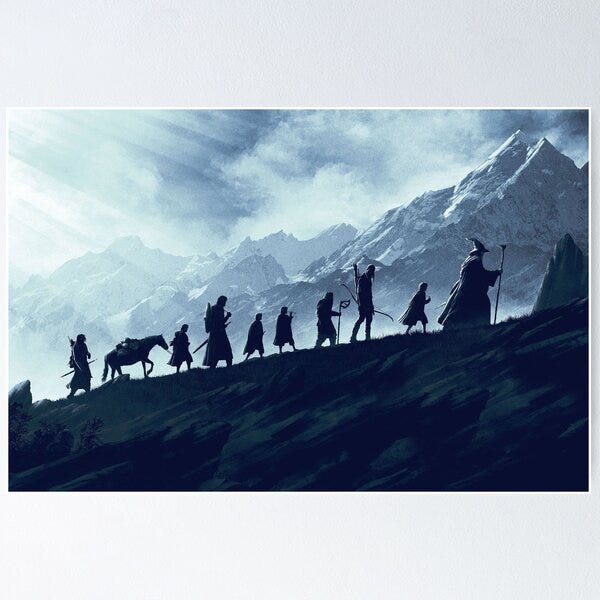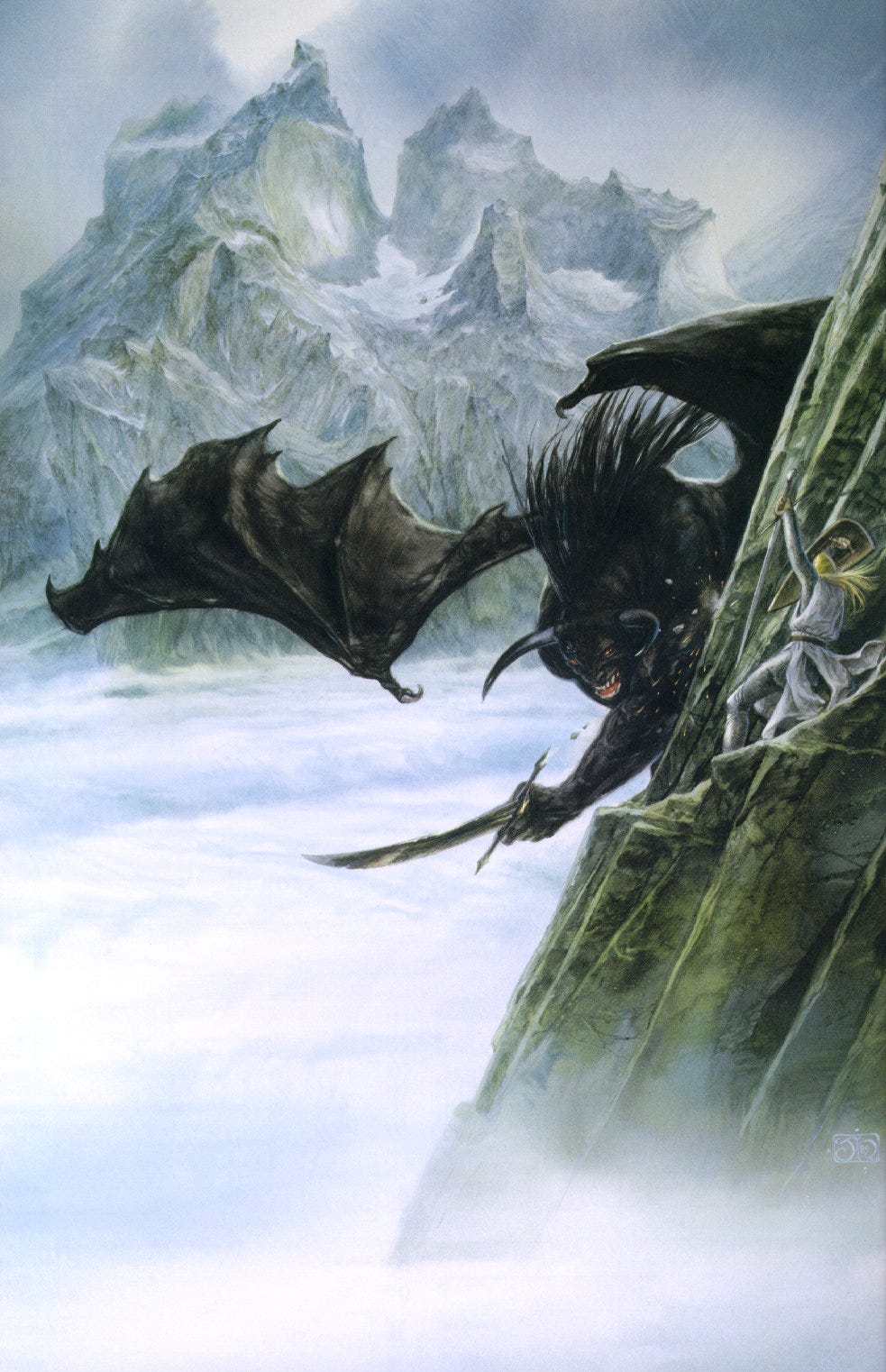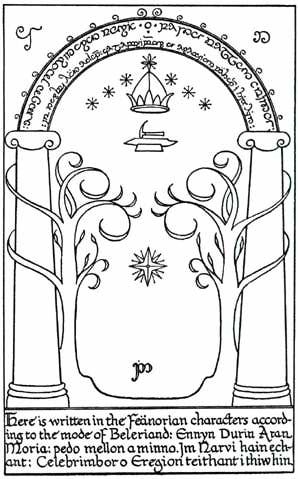Teambuilding lessons from the Fellowship of the Ring
Combining my two geekiest interests - coaching and Lord of the Rings
After writing my most serious thoughts last week I’m following it by writing perhaps my least serious! When I get asked how I decide what to write I always give the same answer - I write about whatever I am interested in at the moment. But 2024 club season has begun and normal service will resume shortly, don’t worry. I’ve also decided that 7 is the right number for list articles in Ultimate so that’s what you can expect from now on.
It’s beginning of the season here in Europe (well, it was recently) and teams are sorting out their goals and how they want their team culture to be. So why not look at the greatest fictional team ever assembled and what lessons we can take from them?
You don’t need the heaviest firepower
‘At least for a while,’ said Elrond. ‘The road must be trod, but it will be very hard. And neither strength nor wisdom will carry us far upon it. This quest may be attempted by the weak with as much hope as the strong. Yet such is oft the course of deeds that move the wheels of the world: small hands do them because they must, while the eyes of the great are elsewhere.’
The Nine Walkers that set out on the quest to destroy the ring are of course no match for the Nine Riders they are opposing. There are of course much stronger warriors in the council - most notably Glorfindel (who may or may not be the same Glorfindel that killed a Balrog in the First Age but regardless he’s still a better bet in a scrap than anyone else there) - but, as we know, the hobbits go on to play huge roles in the quest.
Even looking past the obvious Frodo/Sam heroism we see Merry giving a crucial assist in killing the Witch King, his desperate stab with his blade from the Barrow-wights destroying the magic protecting the Witch King, allowing Eowyn to complete the prophecy that no man would kill him.
It’s not a big or glamourous role - that one stab is all he contributes to the battle but without it our heroes lose that battle and with Gondor fallen Sauron would have no reason to empty Mordor of troops to ensure a win in the next - making Frodo’s quest impossible.
As a coach I’m trying to ensure that everyone on the roster has a part to play. It’s not always going to be a big part. Like Merry, sometimes you play your part in a crucial game early and then are sidelined for the finale. But you have to believe that everyone is going to have a part to play and find them the role where they can make a difference. My biggest regrets coming out of seasons - even where we win - is not finding the right roles for players.
‘Of course, my dear Bilbo,’ said Gandalf. ‘If you had really started this affair, you might be expected to finish it. But you know well enough now that starting is too great a claim for any, and that only a small part is played in great deeds by any hero.
You don’t need to use your enemy’s weapons
At the same council Boromir, understandably, cannot comprehend why they don’t just use the ring against Sauron. Elrond and Gandalf painstakingly explain how this won’t work - the ring is Sauron’s weapon and using it against him is doomed to failure. The Council needs to figure out a way to beat Sauron without using the ring.
I’ve always striven to not do what the best teams do. Copying them is not going to beat them - they’re already better than me at doing those things and while I try replicate what they’re doing they’re already evolving it. Taking inspiration from other teams is great. Copying is not. You need to find your own path.
Have a clear goal from the outset
The fellowship is put together with a very clear purpose - destroy the ring in the fires of Mt. Doom. How that’s going to happen is still unclear. They’ll have to figure it out as they go.
Setting out clear goals for what you want to achieve is the most critical step you can take as a team. This doesn’t have to be a performance goal - your goal could be to recruit 10 new players or train twice a week every week (in my first club this was my first goal when I was captain - and it drove everything else that we achieved over the next decade).
If your goal is clear - like it was for the Fellowship - then every challenge that comes up can be solved because you know where you are trying to get to. When Frodo decides at Amon Hen that he needs to go to Mordor it leaves Aragorn having to make a decision at a catastrophic moment - Boromir is dead, Frodo has fled by himself and the other hobbits are missing. But because the goal is clear he can figure out what best to do - namely find the hobbits then rouse Rohan and Gondor to draw Sauron’s attention, and trust Frodo is fulfilling his part of the quest.
You probably won’t find yourself having quite that amount of drama but whatever challenges you do face you can solve them by referencing your goal.
I think a lot of teams hide behind process goals as a way to duck the bigger, difficult questions about who they are. The process does lead to the outcome, yes. Focus on the process in the moment - always. 100% agree. But your process is dictated by the outcome you’re trying to achieve. Without that clarity the process means nothing.
Always be ready with multiple plans
The first big hurdle for the Fellowship is how to pass the Misty Mountains. Aragorn realllly wants to avoid going underneath via the mines of Moria and pushes to take the Pass of Caradhras over the mountains instead. Gandalf agrees to try this but a malignent snowstorm soon blocks their path. But there’s a plan B - go through Moria.
This is of course, really plan C, since the best route would normally be through the Gap of Rohan but that would take them too close to Isengard.
In Moria tragedy strikes as the Fellowship lose their leader Gandalf. Another change of plans is required - made clearer by the point above - everyone knows what the ultimate goal is.
Approaching any situation with a single rigid plan is doomed to failure. I’m probably very much on the far extreme of wanting a flexible approach and adaptability - I’m terrified of losing a game because we don’t have the right answer for a situation! You don’t have to go to my extreme, but belief that one single system played perfectly will lead you to victory is wishful thinking in knockout ultimate.
Unless of course you are just have better players than everyone else - but then it doesn’t really matter what you do anyway
Listen to input from everywhere
Once the Fellowship reach the entrance to Moria they find the door shut. Gandalf knows how to reveal the hidden door, but doesn’t know the password to open it. But he plans on figuring it out once he gets some peace and quiet!
‘Knock on the doors with your head, Peregrin Took,’ said Gandalf. ‘But if that does not shatter them, and I am allowed a little peace from foolish questions, I will seek for the opening words.
After a lot of waiting - which includes Boromir chucking a rock into the foul pool that laps close to the entrance, causing strange ripples to start showing on the surface, Gandalf finally figures it out.
Gandalf took no notice of them. He sat with his head bowed, either in despair or in anxious thought. The mournful howling of the wolves was heard again. The ripples on the water grew and came closer; some were already lapping on the shore.
With a suddenness that startled them all the wizard sprang to his feet. He was laughing! ‘I have it!’ he cried. ‘Of course, of course! Absurdly simple, like most riddles when you see the answer.’
Picking up his staff he stood before the rock and said in a clear voice: Mellon!
The star shone out briefly and faded again. Then silently a great doorway was outlined, though not a crack or joint had been visible before. Slowly it divided in the middle and swung outwards inch by inch, until both doors lay back against the wall. Through the opening a shadowy stair could be seen climbing steeply up; but beyond the lower steps the darkness was deeper than the night. The Company stared in wonder.
‘I was wrong after all,’ said Gandalf, ‘and Gimli too. Merry, of all people, was on the right track. The opening word was inscribed on the archway all the time! The translation should have been: Say “Friend” and enter. I had only to speak the Elvish word for friend and the doors opened. Quite simple. Too simple for a learned lore-master in these suspicious days. Those were happier times. Now let us go!’
Gandalf should have listened to Merry instead of assuming that only he could figure it out and that he needed to do it alone. I think any coach can understand what that feels like!
I used to feel like a fraud as a coach because some of the most critical in-game changes I would make came from a suggestion from a player on the sideline or in a huddle rather than my own brain. But I’ve reframed this in a more healthy manner: my job is to make the best decisions in the moment. I don’t need to think of everything.
You don’t need to all be the same (or all get along immediately)
When the Fellowship are put together it’s not exactly a well-designed, coherent band. There are problems and tensions between them.
Boromir strongly disgrees with the approach to destroy the ring instead of using it, and there’s also tension between him and Aragorn. Boromir is the heir to the Steward of Gondor who rule Gondor in the lengthy absence of any king, to be point where the Stewards don’t believe there will be one returning. Aragorn, however, is the heir and can claim the throne of Gondor.
Legolas and Gimli hate each other because there’s long standing enmity between elves and dwarves. Pippin’s foolishness (both in actions and questions) annoys Gandalf on multiple occasions.
But, to repeat an earlier point, they are all very clear on their common purpose. Working hard towards that common purpose, sacrificing for that common purpose, is what builds respect between all members of the Fellowship. Boromir sacrifices himself to enable Frodo to escape Saruman’s Uruk-hai. Legolas and Gimli become the best of friends to the point Gimli is even allowed accompany Legolas to the Grey Havens.
It’s the actions taken towards a common goal that binds them.
So many teams I’ve been on try to replicate the trappings of teams with a strong culture, but I’m doubtful on how much those work. Rather than forcing everyone to act a certain way, healthy respect and culture can come from a clear common goal and everyone working hard towards that. Don’t force it, basically.
If in doubt, think what Sam would do
I first read LotR at a very young age - actually, my Dad read the entire book to me and my sister! - and as such I viewed it quite simplistically for a long time. One of the debates I would have was who was the ‘hero’ of the book and I would agonise between all the different characters but I’d usually settle on Sam. (To my delight when I read Tolkien’s letters many years later he heavily implies the same)
Sam is the best teammate you could ask for. Unselfish, courageous, loyal and humble.
He will play the role that is required at the moment. Sometimes that’s going full action hero to kill Shelob and rescue Frodo from the Tower of Cirith Ungol, but it is more commonly to care for and support Frodo which he does throughout but most dramatically right at the end while they are ascending Mt Doom.
I actually saw a really nice quote on a Youtube comment (definitely a first!) saying: we all want a friend like Sam, but we should all actually want to be a friend like Sam’. I think that’s true for teammates as well. If everyone all as unstintingly selfless and loyal like that your team would have the best culture imaginable.






